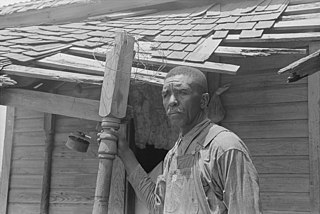
Frederic William Henry Myers was a British poet, classicist, philologist, and a founder of the Society for Psychical Research. Myers' work on psychical research and his ideas about a "subliminal self" were influential in his time, but have not been accepted by the scientific community. However, in 2007 a team of cognitive scientists at University of Virginia School of Medicine, led by Edward F. Kelly published a major empirical-theoretical work, Irreducible Mind, citing various empirical evidence that they think broadly corroborates Myer's conception of human self and its survival of bodily death.

The British Agricultural Revolution, or Second Agricultural Revolution, was an unprecedented increase in agricultural production in Britain arising from increases in labor and land productivity between the mid-17th and late 19th centuries. Agricultural output grew faster than the population over the hundred-year period ending in 1770, and thereafter productivity remained among the highest in the world. This increase in the food supply contributed to the rapid growth of population in England and Wales, from 5.5 million in 1700 to over 9 million by 1801, though domestic production gave way increasingly to food imports in the 19th century as the population more than tripled to over 35 million.

Enclosure or inclosure is a term, used in English landownership, that refers to the appropriation of "waste" or "common land" enclosing it and by doing so depriving commoners of their rights of access and privilege. Agreements to enclose land could be either through a formal or informal process. The process could normally be accomplished in three ways. First there was the creation of "closes", taken out of larger common fields by their owners. Secondly, there was enclosure by proprietors, owners who acted together, usually small farmers or squires, leading to the enclosure of whole parishes. Finally there were enclosures by Acts of Parliament.

A tenant farmer is a person who resides on land owned by a landlord. Tenant farming is an agricultural production system in which landowners contribute their land and often a measure of operating capital and management, while tenant farmers contribute their labor along with at times varying amounts of capital and management. Depending on the contract, tenants can make payments to the owner either of a fixed portion of the product, in cash or in a combination. The rights the tenant has over the land, the form, and measures of payment vary across systems. In some systems, the tenant could be evicted at whim ; in others, the landowner and tenant sign a contract for a fixed number of years. In most developed countries today, at least some restrictions are placed on the rights of landlords to evict tenants under normal circumstances.

The open back rounded vowel, or low back rounded vowel, is a type of vowel sound, used in some spoken languages. The symbol in the International Phonetic Alphabet that represents this sound is ⟨ɒ⟩. It is called Latin turned alpha being a rotated version of Latin alpha. It seems a "turned script a", being a rotated version of "script (cursive) a", which is the variant of a that lacks the extra stroke on top of a "printed a". Latin turned alpha a ⟨ɒ⟩ has its linear stroke on the left, whereas Latin alpha a ⟨ɑ⟩ has its linear stroke on the right.

Agriculture began independently in different parts of the globe, and included a diverse range of taxa. At least eleven separate regions of the Old and New World were involved as independent centers of origin. The development of agriculture about 12,000 years ago changed the way humans lived. They switched from nomadic hunter-gatherer lifestyles to permanent settlements and farming.

Paleobiology is an interdisciplinary field that combines the methods and findings found in both the earth sciences and the life sciences. Paleobiology is not to be confused with geobiology, which focuses more on the interactions between the biosphere and the physical Earth.

Longthorpe Tower is a 14th-century three-storey tower in the Longthorpe area of Peterborough, Cambridgeshire, England. It is famous for its well-preserved set of medieval murals.

Mixed farming is a type of farming which involves both the growing of crops and the raising of livestock. Such agriculture occurs across Asia and in countries such as India, Malaysia, Indonesia, Afghanistan, South Africa, China, Central Europe, Nordic countries, Canada, and Russia. Though at first it mainly served domestic consumption, countries such as the United States and Japan now use it for commercial purposes.
Robert Paul Brenner is an American economic historian. He is a professor emeritus of history and director of the Center for Social Theory and Comparative History at UCLA, editor of the socialist journal Against the Current, and editorial committee member of New Left Review. His research interests are early modern European history, economic, social and religious history, agrarian history, social theory/Marxism, and Tudor–Stuart England.
Irene Joan Thirsk, was a British economic and social historian, specialising in the history of agriculture. She was the leading British early modern agrarian historian of her era, as well as an important social and economic historian. Her work highlighted the regional differences in agricultural practices in England. She also had an interest in food history and local English history, in particular of Hadlow, Kent.
Ralph Austen was an English writer on gardening and husbandry, who urged the use of concise, plain language. He also worked to popularize cider as a beverage.
The post-Napoleonic Depression was an economic depression in Europe and the United States after the end of the Napoleonic Wars in 1815. In England and Wales, an agricultural depression led to the passage of the Corn Laws, and placed great strain on the system of poor relief inherited from Elizabethan times.
Drapers Professor of Agriculture was a professorship at the University of Cambridge. County councils in England petitioned the university to offer agricultural education in the 1880s, but it argued against doing so as it was deemed incompatible with an academic education. The colleges of the university were major landowners however and this led to the university accepting an endowment from the Worshipful Company of Drapers in 1899.

Agriculture in Scotland in the Middle Ages includes all forms of farm production in the modern boundaries of Scotland, between the departure of the Romans from Britain in the fifth century and the establishment of the Renaissance in the early sixteenth century. Scotland has between a fifth and a sixth of the amount of the arable or good pastoral land of England and Wales, mostly located in the south and east. Heavy rainfall encouraged the spread of acidic blanket peat bog, which with wind and salt spray, made most of the western islands treeless. The existence of hills, mountains, quicksands and marshes made internal communication and agriculture difficult. Most farms had to produce a self-sufficient diet of meat, dairy products and cereals, supplemented by hunter-gathering. The early Middle Ages were a period of climate deterioration resulting in more land becoming unproductive. Farming was based around a single homestead or a small cluster of three or four homes, each probably containing a nuclear family and cattle were the most important domesticated animal.

The General View series of county surveys was an initiative of the Board of Agriculture of Great Britain, of the early 1790s. Many of these works had second editions, in the 1810s.
The Jat people are a traditionally agricultural community in Northern India and Pakistan. Originally pastoralists in the lower Indus river-valley of Sindh, many Jats migrated north into the Punjab region in late medieval times, and subsequently into the Delhi Territory, northeastern Rajputana, and the western Gangetic Plain in the 17th and 18th centuries. Of Hindu, Muslim and Sikh faiths, they are now found mostly in the Indian states of Punjab, Haryana, Uttar Pradesh and Rajasthan and the Pakistani provinces of Sindh and Punjab.
Robert Child (1613–1654) was an English physician, agriculturalist and alchemist. A recent view is that his approach to agriculture belongs to the early ideas on political economy.
Tithe commutation was a 19th-century reform of land tenure in Great Britain and Ireland, which implemented an exchange of the payment of a tithe to the clergy of the established church, which were traditionally paid in kind, to a system based in an annual cash payment, or once-for-all payment. The system had become complex, with lay owners by impropriation entitled to some tithes, which were of a number of kinds.
Rowland Richard Robbins (1872–1960) was an English farmer, known for market gardening on a large scale, and also for involvement in farming affairs at a national level.









